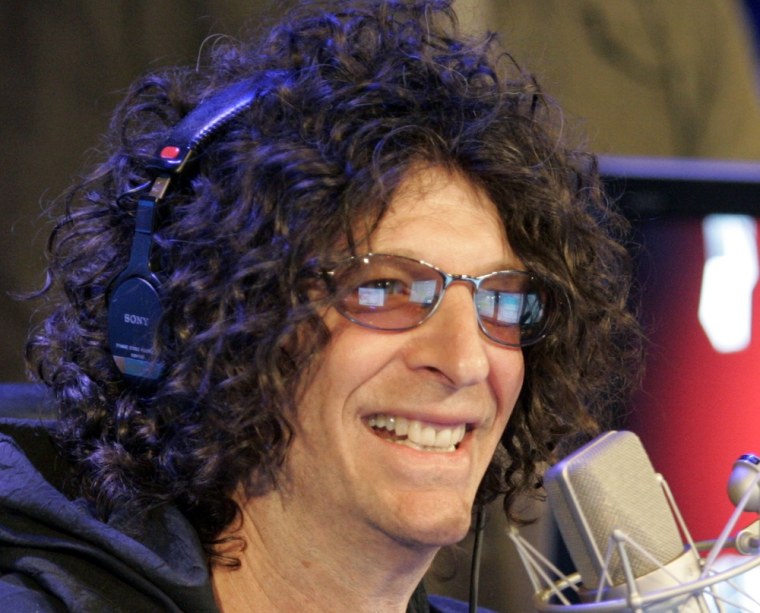Just months after signing a new $400 million contract with SiriusXM Radio, talk show host Howard Stern says he's not getting paid enough by his employer.
In a lawsuit filed Tuesday in New York, Stern, his agent Don Buchwald and Stern's production company, One Twelve Inc., claim Sirius failed to pay stock awards due in exchange for helping the satellite radio service exceed its subscriber growth targets.
A Sirius executive said the company was "surprised and disappointed" by the lawsuit.
Since first launching in the 1990s, satellite radio has endured a rocky ride, and Stern has taken credit for all but single-handedly rescuing the industry from financial ruin. While the claim is not surprising coming from the self-proclaimed King of All Media, analysts who follow the company say it's hard to overstate Stern's contribution to the company.
"There's no doubt that Howard Stern made Sirius — absolutely no doubt," said Barton Crockett, a media analyst at Lazard Capital. "You hate to see a situation like this where Sirius and Howard Stern have done so well together — they're legendary — to see it wind up in some kind of lawsuit is just really unfortunate."
While Stern has raked in more than $500 million since joining up with Sirius in 2004, the two sides are now at odds over subscribers that Sirius picked up with it merged with XM satellite radio in 2008. That came after a 2006 bonus to Stern was awarded based on subscribers added to Sirius. Stern and his agent seem to be claiming they're owed for those added XM customers, while the company disputes it, said Crockett.
Regardless of Stern's role in the success of SiriusXM, there's little disagreement that the industry has traveled a bumpy path since launching in 1997. To try to foster competition, the FCC awarded licenses to two separate companies, Sirius and XM.
The companies soon began burning through hundreds of millions of dollars to launch the satellites needed to beam music, news, sports entertainment and other programming to subscribers, most of whom listen from their cars.
But those listeners were slow to warm up to paying a monthly fee to listen to radio — something they had become accustomed to getting for free. To boost subscribers, Sirius and XM racked up heavy losses subsidizing the cost of car receivers and then paying for costly programming.
The two companies shelled out generously for sports and entertainment programming, signing up Martha Stewart and Oprah Winfrey, and buying broadcast rights for the NFL, Major League Baseball, NASCAR, NBA, NHL. But subscriber growth remained weak. Churn rates were high as listeners signed up for the service and then canceled.
Stern's five-year, $500 million deal in 2004 represented the high water mark of costly contracts and apparently succeeded in boosting Sirius' subscriber base.
In January 2007, Sirius paid Stern an $83 million stock bonus after the company beat subscriber targets set in his original contract. The company said at the time that it paid Stern slightly more than 22 million shares of stock after exceeding a year-end subscriber goal for 2006 by more than two million. Sirius ended that year with just over 6 million subscribers, compared with projections of about 3.5 million from Wall Street analysts when the company signed Stern’s employment agreement.
That 2006 bonus is at the heart of Stern's lawsuit, which claims that SiriusXM Radio failed to pay him in full. Stern and his agent, say that Sirius made an initial payment in January 2006 but failed to make subsequent payments over the next four years.
"We have met all of our obligations under the terms of our 2004 agreement with Howard, his agent and production company," said Patrick Reilly, the SiriusXM's senior vice president, communications. He noted that the company just signed a contract through 2015 with Stern and was "thus surprised and disappointed" by the lawsuit.
In 2008, with subscriber growth stalled and losses mounting, Sirius and XM asked the FCC to lift its original requirement that the two licenses be operated by separate companies. Faced with the prospect of one or both going silent, the commission approved the merger that created SiriusXM.
The deal has finally put satellite radio on a sound financial footing, according to Crockett.
"These guys are now set up to be a free cash flow machine," he said.
Subscriber growth has also stabilized with less churn, and some 45 percent of new car buyers sign on up for a subscription, he said. The company now has more than 20 million subscribers.
According to the suit, Buchwald and Stern were told last year by SiriusXM's general counsel, Richard Basch, that the bonus stock awards were not granted because the company did not include XM's subscriber base toward the total number of Sirius subscribers.
"When Sirius needed Stern, it promised him a share in any success that the company achieved," the suit said. "But now that Sirius has conquered its chief competitor and acquired more than 20 million subscribers, it has reneged on its commitment to Stern, unilaterally deciding that it has paid him enough."
Some analysts caution that satellite radio faces another threat over the horizon: the arrival of Internet access in cars. That could present mean new competition from music services like Pandora that stream music and other programming over the Web.
Crockett says that potential threat makes high-profile, premium programming like Howard Stern all the more valuable to SiriusXM — just as it begins to provide its investors with a long-awaited return.
Stern and Sirius publicly feuded for months last year as his $500 million, five-year contract was coming to an end. He announced on his weekday morning show in December he had agreed to a new deal running through 2015, although terms were not disclosed.
